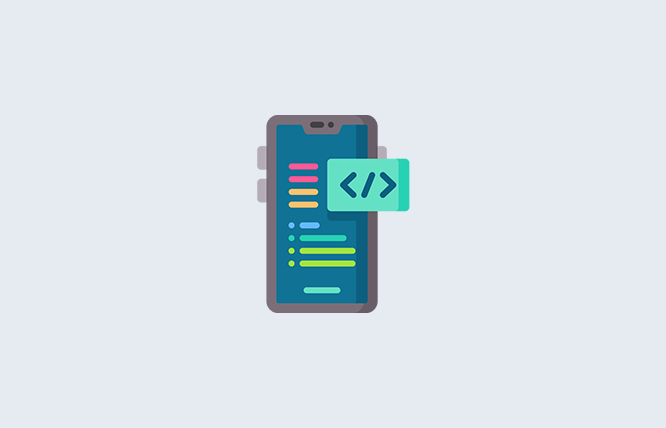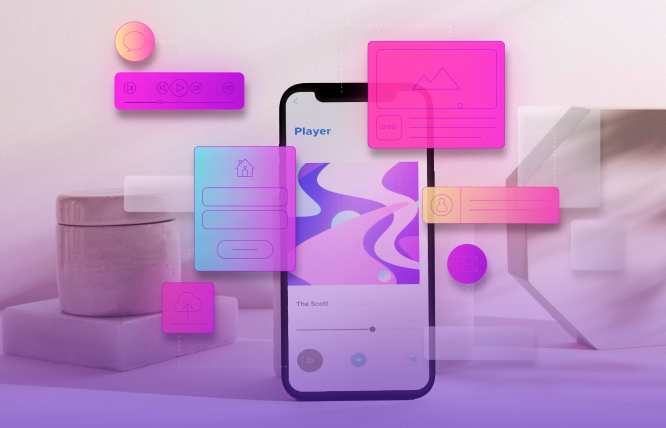This blog will discuss the factors you need to take into consideration when it comes to choosing the right app development platform for your business. We will discuss the following:
- What an app development platform is and how it helps businesses in the development process
- Factors that should be kept in consideration such as features, development time, security and more
- The best app development platforms in the market today along with their pros and cons.
We have entered the digital era, with more people having access to smartphones and the internet than ever before. According to studies, there are currently 6.3 billion mobile users worldwide, with people spending 88% of their time on mobile apps.
With an audience as massive as this, it only makes sense for businesses to create a mobile application revolving around their organisation. While deciding to create a mobile app is essentially a no brainer, the real question lies in what platform will you need for your app development process.
In this article we will discuss all the aspects you need to keep in consideration when choosing the right app development platform for your business, as well as some of the top platforms that industry leaders are using for their organisation.
What are App Development Platforms?
Before we can look into the factors of choosing a platform, we first need to understand what an app development platform is. In simple terms, a mobile app development platform pertains of tools and framework that help develop the application.
The primary purpose of the platform is to streamline the process of development by minimising time to code and offering various features that work for both cross-form and native applications.
There are several various platforms that organisations use to get their mobile application developed. While it primarily depends on the organisation’s needs, following are some of the leading app development platforms:
- Native Development Platforms (iOS and Android)
Native development platforms are designed to create dedicated applications for specific operating systems, ensuring peak performance and functionality.
- Cross-Platform Development Platforms (React Native and Flutter)
Cross-platform development enables building apps for multiple systems with shared code, balancing efficiency and consistency.
- Low-Code/No-Code Platforms (Mendix and Appian)
No-code/low-code platforms simplify app creation, requiring minimal coding, making development accessible to non-programmers.
- Backend as a Service (BaaS) Platforms (Firebase and AWS Amplify)
Backend as a Service (BaaS) platforms, like Firebase, offer cloud-based backend solutions, handling server-side functionalities, and simplifying app development.
- Game Development Platforms (Unity)
Game development platforms (e.g., Unity) provide tools for creating video games, offering graphics, physics, and scripting capabilities for diverse gaming experiences.
- Enterprise App Development Platforms (Microsoft Power Apps)
Enterprise app development platforms, such as Microsoft Power Apps, streamline creating business apps. They often feature low-code tools, ensuring quicker development, and easy customization for specific organizational needs without extensive coding expertise.
Let’s dive into the factors necessary to consider when deciding what type of development platform would suit you best.
Factors To Consider When Choosing A Platform
The platform you choose to develop your mobile application can make or break your efforts towards gathering new audience and building awareness for your brand. Creating a mobile app is not just a matter of deciding to do so, rather, you need to put in research and analyse your requirements. Once that is done, you can choose a platform.
Following are some factors that are absolutely vital when analysing your requirements for a mobile application and which platform to choose.
Organisational Needs
The first step is understanding why you need a mobile application in the first place. Different organisations will have different objectives for their mobile application, and based on these objectives, can you start to choose your platform.
It is essential to clearly define the business objectives that the mobile application is expected to achieve, whether it’s expanding market reach, improving customer engagement, or increasing revenue. The chosen platform should align with these objectives.
Features Required
The next factor to consider is the features that your application requires. Different platforms offer specific advantages based on functionality, performance, UI/UX, and security measures.
You need to consider what you prioritise for your application and pick a suitable platform accordingly. Whether you prioritize seamless integration with device capabilities, quick development cycles, or adherence to platform-specific design guidelines, careful consideration is crucial.
Compatibility
Selecting the best mobile app development platform can be strongly influenced by compatibility considerations. Different platforms offer varying levels of compatibility.
Whether it’s ensuring seamless integration with specific hardware features, cross-platform compatibility, or adherence to platform guidelines, a thorough assessment is essential. Therefore, when you are looking to select the perfect platform, ensure that it offer the compatibility you require as per your business requirements.
Time To Develop
Businesses are always looking for the most efficient way to take their application to market. While some organisations want to take it to market as soon as possible, others focus on creating a highly functional application before releasing it to the public.
Every platform can have a different timeframe when it comes to developing your mobile application. This, coupled with the features and functionality you require can increase or decrease the development time. Be sure to consult with your developer, discuss all your requirements and come to a decision on the deadline.
Security Protocols
Data privacy is now seen as a fundamental right for businesses and customers alike. When creating a mobile app on a specific platform, be sure to consider the security it offers. It is important to assess its capacity to ensure secure data transmission, storage, data encryption, and user authentication. Additionally, adherence to industry standards and data privacy compliance with app store guidelines contribute to the overall security posture.
A robust security framework not only protects user privacy but also fosters trust, enhancing the app’s reputation and reducing the risk of data breaches. This is taken a step further when we talk about applications that allow users to make a transaction. Ultimately, prioritizing security in the platform selection process is fundamental to the long-term success and reliability of the mobile app.
Scalability
Scalability stands as a pivotal factor in the decision-making process when selecting a mobile app development platform. The ability of an app to efficiently handle growth in user base, increased data volume, and expanding functionalities is crucial for long-term success.
Whether it’s handling a surge in concurrent users or scaling backend infrastructure, the chosen platform should provide robust solutions for scaling both horizontally and vertically.
Top 3 App Development Platforms and Their Benefits
There are a number of app development platforms for businesses to choose from. Each of these platforms have their own benefits as well as setbacks. Based on your analysis and research as discussed above, you can now look towards making a decision.
We are going to discuss the top 3 app development platforms of the current era and talk about the benefits it provides as well as any cons that it may have so you have a complete picture of each of these platforms.
Flutter
is a mobile app development platform powered by Google which allows developers to build high-quality and aesthetic applications for both iOS and Android from a single codebase. Flutter
With a widget-based system for create consistent and customizable user interfaces and its hot-reload feature, enabling developers to see instant results of their code changes, Flutter is particularly popular for its ability to deliver native-like performance.
Here are the pros and cons of using Flutter as your app development platform
| Pros | Cons |
| Single codebase allowing better development time | Larger app sizes that might impact the load time of the application |
| Consistent UI to maintain a cohesive look within the application | Limited libraries that can hinder functionality when compared to other platforms. |
| High performance offering a near-native app experience | Newer ecosystem that is still evolving which means some tools might be less mature |
| Features such as Widget Library and Hot Reload to assist in the development process | Restricts platform specific APIs requiring developers to use platform channels for integration. |
Ionic
Ionic is a framework for building mobile applications. It provides a set of tools and pre-built components that make it easier for developers to create apps that work on both iOS and Android devices. The key advantage of Ionic is that it allows you to write your app’s code once and run it on different platforms, saving time and effort.
While Ionic is relatively new, it is making waves in the app development market and several developers prefer this platform due to its angular framework.
Ionic has several similarities to Flutter but let’s look at the pros and cons of Ionic to see which platform comes out on top.
| Pros | Cons |
| Cross-platform compatibility with a single codebase, improving efficiency and minimising development time | While Ionic is still evolving, the performance level is still not at the same level as other app development platforms |
| Follows an angular framework to provide a more organised and structured app development process | Due to its dependency on WebView, Ionic applications might have a less native look and feel as compared to others. |
| Cordova integrations that allow for more compatibility with various native device features. | While Cordova plugins offer native functionality, some of the latest features may be limited on the platform |
| Leverages web technologies to maximise effectiveness during the development process. | The learning curve for developing on Ionic is steep and developers that are not well-versed with Angular can have a tough time |
React Native
React Native is a mobile app development platform by Facebook that lets you create apps for both iOS and Android using the same codebase. It’s based on the popular web library React, making it easier for developers familiar with React to transition to . mobile app development
React Native allows for efficient code reuse, and it lets you see the changes you make in real-time with its “hot-reloading” feature. This platform is known for building apps with a native look and feel while simplifying the development process for cross-platform applications.
While React Native is considered one of the most popular app development platforms currently, it is important to weigh the pros and cons before making a decision.
| Pros | Cons |
| Cross-Platform Development and code reusability allows developers to simplify the development process | Limited access to native features can sometimes hinder the functionality of your application |
| React Native has an existing community that is always available to provide support. | The large app size can often impact download and installation times which negatively impact user experience |
| Due to its performance, React Native offers an almost native application experience | Dependency on third-party modules can often restrict developers from creating the perfect application. |
| Uses declarative syntax for UI, allowing easier understanding and maintenance | Updates to React Native may introduce breaking changes and compatibility with projects can take time. |
Conclusion
So, the question is, what platform is the best for? There is no single answer to this question. It all boils down to what your priorities are when it comes to your app. mobile app development
If you are looking to make an app for your online store, data privacy and functionality might be your top priority, while creating an application that just outlines your services might be less functionality based and more focused on being easily and quickly developed.
It is important to conduct the research necessary to ensure that you pick an app development platform that is best suited for your business needs. You can also consult with an expert developer and discuss your requirements and priorities to choose the best platform for you.
Frequently Asked Questions
Have questions or feedback?
Get in touch with us and we‘l get back to you and help as soon as we can!




